Analysis of Enron Scandal: Corporate Governance and Sarbanes-Oxley Act
VerifiedAdded on 2023/01/06
|10
|2812
|81
Report
AI Summary
This report examines the Enron scandal, a significant case of corporate fraud and accounting irregularities. It provides an overview of Enron's rise and fall, highlighting the key players involved, including Kenneth Lay, Jeffrey Skilling, and Arthur Andersen. The report delves into the failures of corporate governance that contributed to the scandal, discussing unethical practices and the manipulation of financial statements. Furthermore, it analyzes the Sarbanes-Oxley Act of 2002 (SOX), which was enacted in response to scandals like Enron, detailing its provisions for corporate responsibility, accounting regulations, and investor protection. The report also explores the criticisms and opposing viewpoints surrounding SOX, providing a comprehensive understanding of the scandal's impact and the regulatory responses implemented to prevent future occurrences. The report emphasizes the importance of corporate governance in maintaining ethical business practices and financial transparency.
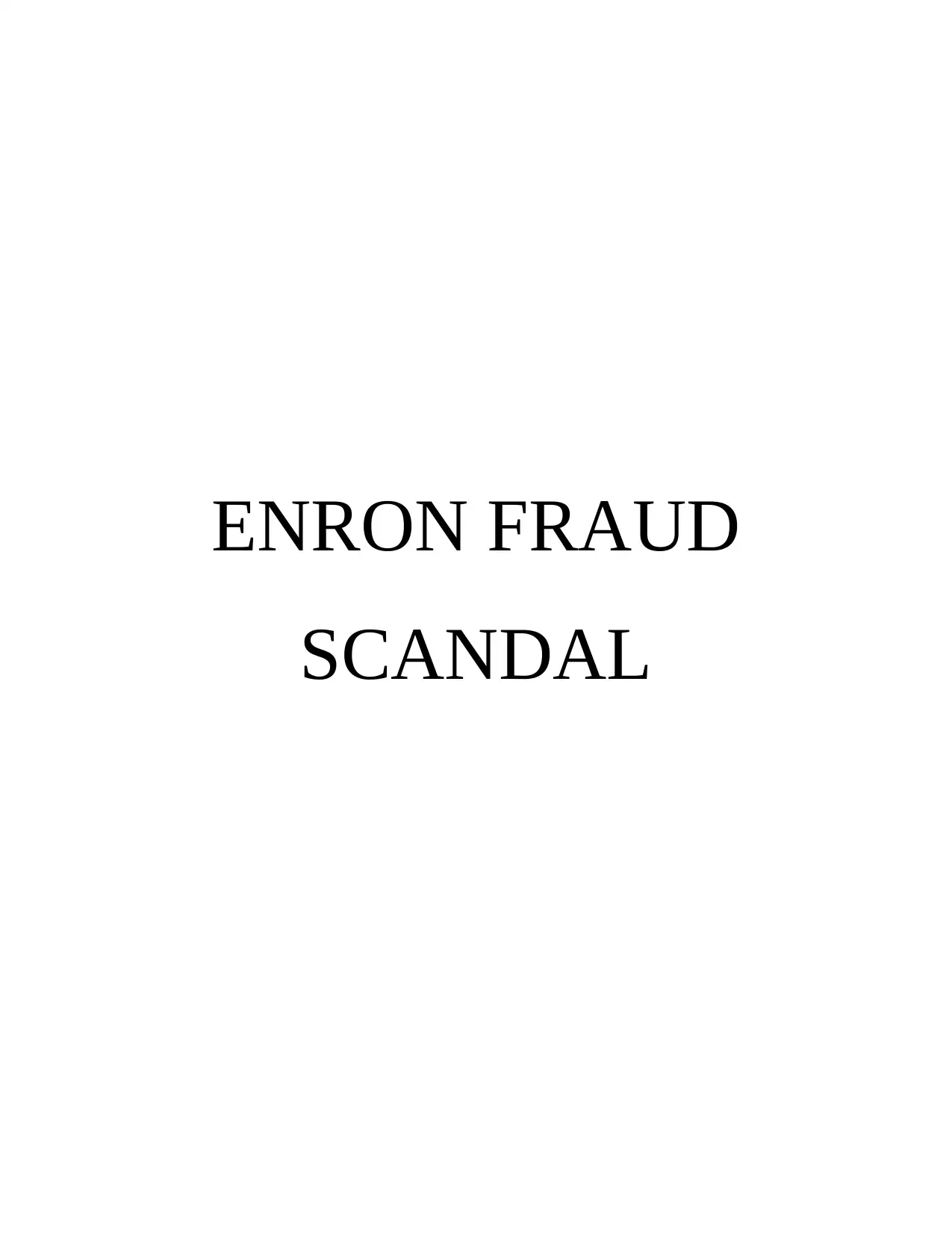
ENRON FRAUD
SCANDAL
SCANDAL
Paraphrase This Document
Need a fresh take? Get an instant paraphrase of this document with our AI Paraphraser
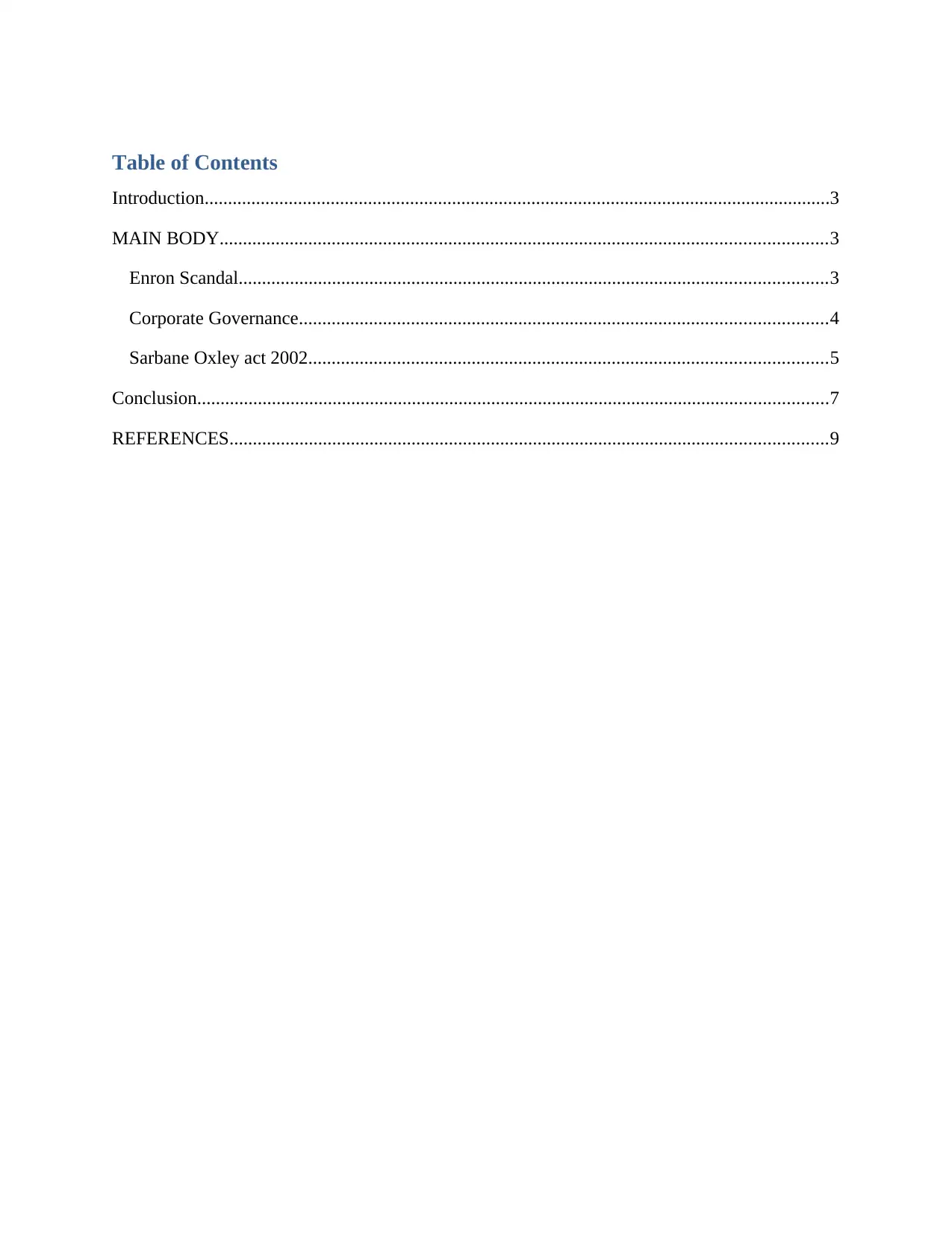
Table of Contents
Introduction......................................................................................................................................3
MAIN BODY..................................................................................................................................3
Enron Scandal..............................................................................................................................3
Corporate Governance.................................................................................................................4
Sarbane Oxley act 2002...............................................................................................................5
Conclusion.......................................................................................................................................7
REFERENCES................................................................................................................................9
Introduction......................................................................................................................................3
MAIN BODY..................................................................................................................................3
Enron Scandal..............................................................................................................................3
Corporate Governance.................................................................................................................4
Sarbane Oxley act 2002...............................................................................................................5
Conclusion.......................................................................................................................................7
REFERENCES................................................................................................................................9
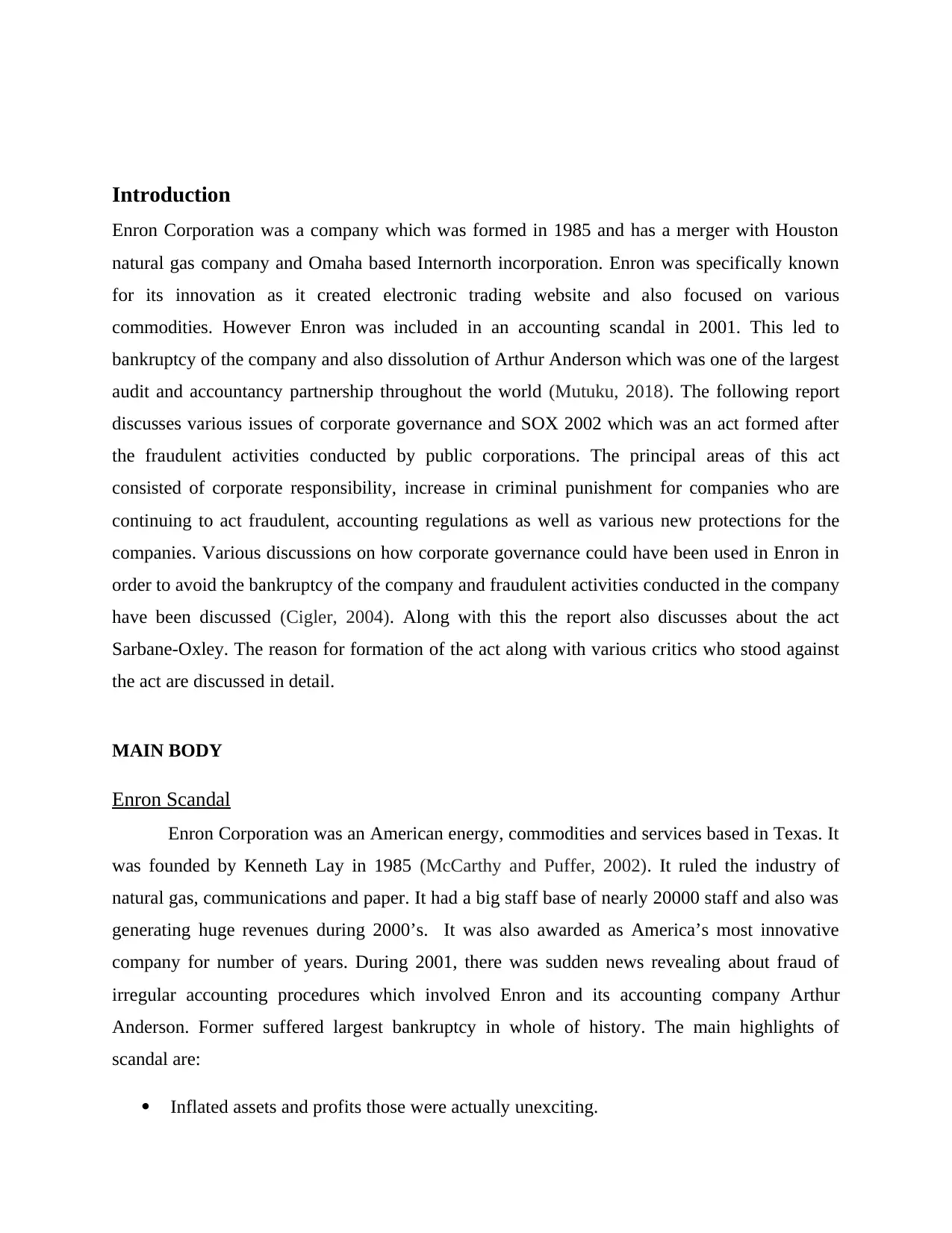
Introduction
Enron Corporation was a company which was formed in 1985 and has a merger with Houston
natural gas company and Omaha based Internorth incorporation. Enron was specifically known
for its innovation as it created electronic trading website and also focused on various
commodities. However Enron was included in an accounting scandal in 2001. This led to
bankruptcy of the company and also dissolution of Arthur Anderson which was one of the largest
audit and accountancy partnership throughout the world (Mutuku, 2018). The following report
discusses various issues of corporate governance and SOX 2002 which was an act formed after
the fraudulent activities conducted by public corporations. The principal areas of this act
consisted of corporate responsibility, increase in criminal punishment for companies who are
continuing to act fraudulent, accounting regulations as well as various new protections for the
companies. Various discussions on how corporate governance could have been used in Enron in
order to avoid the bankruptcy of the company and fraudulent activities conducted in the company
have been discussed (Cigler, 2004). Along with this the report also discusses about the act
Sarbane-Oxley. The reason for formation of the act along with various critics who stood against
the act are discussed in detail.
MAIN BODY
Enron Scandal
Enron Corporation was an American energy, commodities and services based in Texas. It
was founded by Kenneth Lay in 1985 (McCarthy and Puffer, 2002). It ruled the industry of
natural gas, communications and paper. It had a big staff base of nearly 20000 staff and also was
generating huge revenues during 2000’s. It was also awarded as America’s most innovative
company for number of years. During 2001, there was sudden news revealing about fraud of
irregular accounting procedures which involved Enron and its accounting company Arthur
Anderson. Former suffered largest bankruptcy in whole of history. The main highlights of
scandal are:
Inflated assets and profits those were actually unexciting.
Enron Corporation was a company which was formed in 1985 and has a merger with Houston
natural gas company and Omaha based Internorth incorporation. Enron was specifically known
for its innovation as it created electronic trading website and also focused on various
commodities. However Enron was included in an accounting scandal in 2001. This led to
bankruptcy of the company and also dissolution of Arthur Anderson which was one of the largest
audit and accountancy partnership throughout the world (Mutuku, 2018). The following report
discusses various issues of corporate governance and SOX 2002 which was an act formed after
the fraudulent activities conducted by public corporations. The principal areas of this act
consisted of corporate responsibility, increase in criminal punishment for companies who are
continuing to act fraudulent, accounting regulations as well as various new protections for the
companies. Various discussions on how corporate governance could have been used in Enron in
order to avoid the bankruptcy of the company and fraudulent activities conducted in the company
have been discussed (Cigler, 2004). Along with this the report also discusses about the act
Sarbane-Oxley. The reason for formation of the act along with various critics who stood against
the act are discussed in detail.
MAIN BODY
Enron Scandal
Enron Corporation was an American energy, commodities and services based in Texas. It
was founded by Kenneth Lay in 1985 (McCarthy and Puffer, 2002). It ruled the industry of
natural gas, communications and paper. It had a big staff base of nearly 20000 staff and also was
generating huge revenues during 2000’s. It was also awarded as America’s most innovative
company for number of years. During 2001, there was sudden news revealing about fraud of
irregular accounting procedures which involved Enron and its accounting company Arthur
Anderson. Former suffered largest bankruptcy in whole of history. The main highlights of
scandal are:
Inflated assets and profits those were actually unexciting.
⊘ This is a preview!⊘
Do you want full access?
Subscribe today to unlock all pages.

Trusted by 1+ million students worldwide
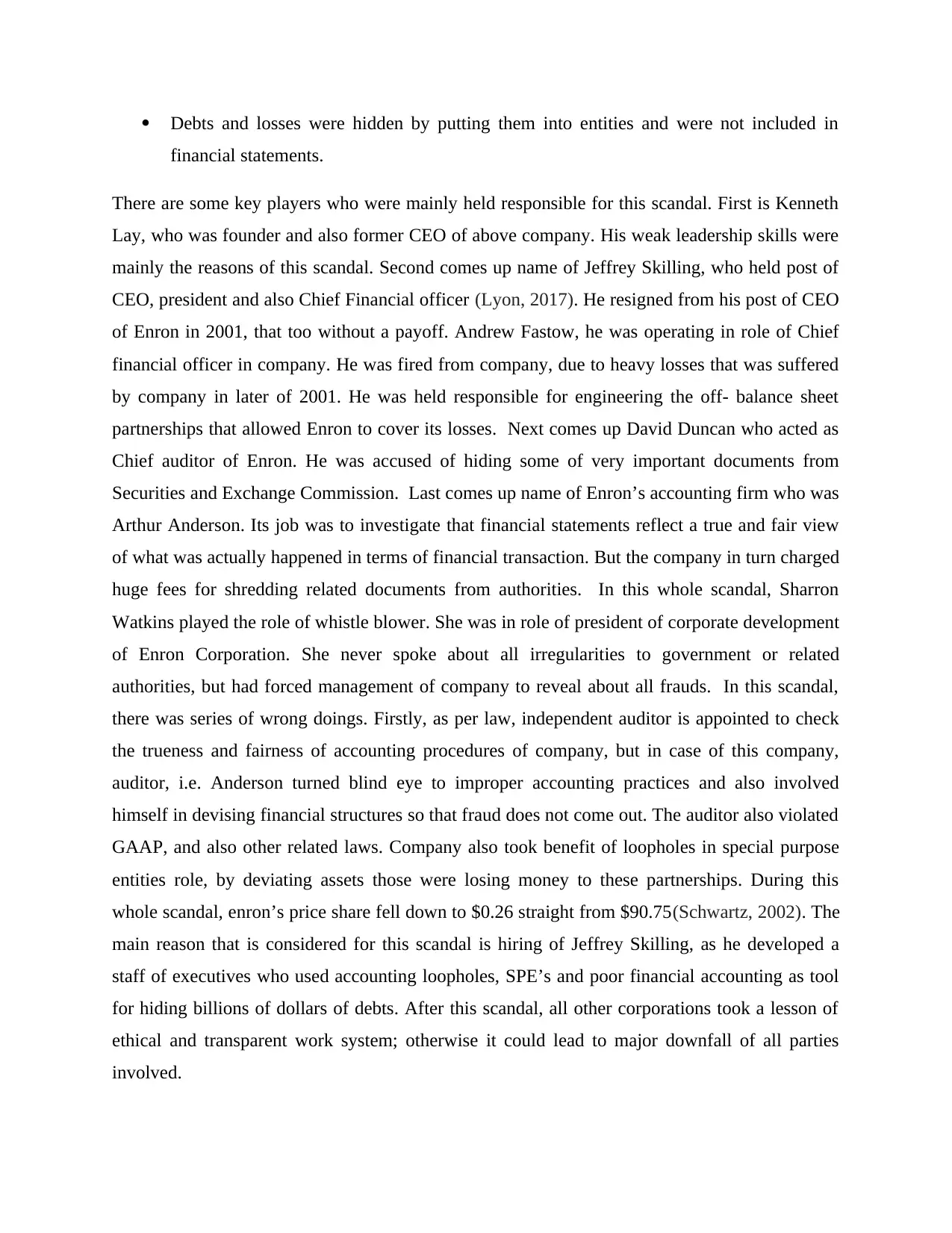
Debts and losses were hidden by putting them into entities and were not included in
financial statements.
There are some key players who were mainly held responsible for this scandal. First is Kenneth
Lay, who was founder and also former CEO of above company. His weak leadership skills were
mainly the reasons of this scandal. Second comes up name of Jeffrey Skilling, who held post of
CEO, president and also Chief Financial officer (Lyon, 2017). He resigned from his post of CEO
of Enron in 2001, that too without a payoff. Andrew Fastow, he was operating in role of Chief
financial officer in company. He was fired from company, due to heavy losses that was suffered
by company in later of 2001. He was held responsible for engineering the off- balance sheet
partnerships that allowed Enron to cover its losses. Next comes up David Duncan who acted as
Chief auditor of Enron. He was accused of hiding some of very important documents from
Securities and Exchange Commission. Last comes up name of Enron’s accounting firm who was
Arthur Anderson. Its job was to investigate that financial statements reflect a true and fair view
of what was actually happened in terms of financial transaction. But the company in turn charged
huge fees for shredding related documents from authorities. In this whole scandal, Sharron
Watkins played the role of whistle blower. She was in role of president of corporate development
of Enron Corporation. She never spoke about all irregularities to government or related
authorities, but had forced management of company to reveal about all frauds. In this scandal,
there was series of wrong doings. Firstly, as per law, independent auditor is appointed to check
the trueness and fairness of accounting procedures of company, but in case of this company,
auditor, i.e. Anderson turned blind eye to improper accounting practices and also involved
himself in devising financial structures so that fraud does not come out. The auditor also violated
GAAP, and also other related laws. Company also took benefit of loopholes in special purpose
entities role, by deviating assets those were losing money to these partnerships. During this
whole scandal, enron’s price share fell down to $0.26 straight from $90.75(Schwartz, 2002). The
main reason that is considered for this scandal is hiring of Jeffrey Skilling, as he developed a
staff of executives who used accounting loopholes, SPE’s and poor financial accounting as tool
for hiding billions of dollars of debts. After this scandal, all other corporations took a lesson of
ethical and transparent work system; otherwise it could lead to major downfall of all parties
involved.
financial statements.
There are some key players who were mainly held responsible for this scandal. First is Kenneth
Lay, who was founder and also former CEO of above company. His weak leadership skills were
mainly the reasons of this scandal. Second comes up name of Jeffrey Skilling, who held post of
CEO, president and also Chief Financial officer (Lyon, 2017). He resigned from his post of CEO
of Enron in 2001, that too without a payoff. Andrew Fastow, he was operating in role of Chief
financial officer in company. He was fired from company, due to heavy losses that was suffered
by company in later of 2001. He was held responsible for engineering the off- balance sheet
partnerships that allowed Enron to cover its losses. Next comes up David Duncan who acted as
Chief auditor of Enron. He was accused of hiding some of very important documents from
Securities and Exchange Commission. Last comes up name of Enron’s accounting firm who was
Arthur Anderson. Its job was to investigate that financial statements reflect a true and fair view
of what was actually happened in terms of financial transaction. But the company in turn charged
huge fees for shredding related documents from authorities. In this whole scandal, Sharron
Watkins played the role of whistle blower. She was in role of president of corporate development
of Enron Corporation. She never spoke about all irregularities to government or related
authorities, but had forced management of company to reveal about all frauds. In this scandal,
there was series of wrong doings. Firstly, as per law, independent auditor is appointed to check
the trueness and fairness of accounting procedures of company, but in case of this company,
auditor, i.e. Anderson turned blind eye to improper accounting practices and also involved
himself in devising financial structures so that fraud does not come out. The auditor also violated
GAAP, and also other related laws. Company also took benefit of loopholes in special purpose
entities role, by deviating assets those were losing money to these partnerships. During this
whole scandal, enron’s price share fell down to $0.26 straight from $90.75(Schwartz, 2002). The
main reason that is considered for this scandal is hiring of Jeffrey Skilling, as he developed a
staff of executives who used accounting loopholes, SPE’s and poor financial accounting as tool
for hiding billions of dollars of debts. After this scandal, all other corporations took a lesson of
ethical and transparent work system; otherwise it could lead to major downfall of all parties
involved.
Paraphrase This Document
Need a fresh take? Get an instant paraphrase of this document with our AI Paraphraser
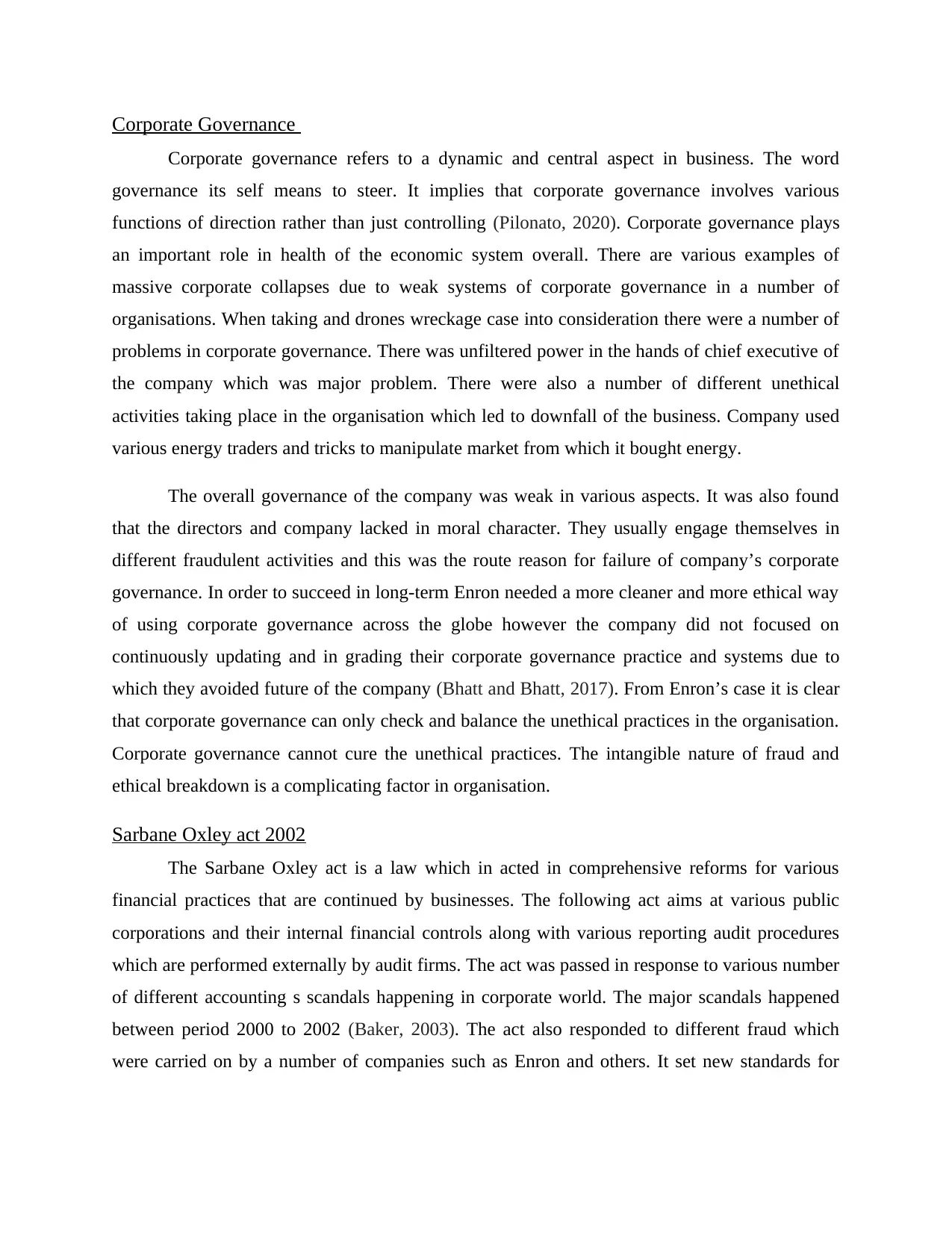
Corporate Governance
Corporate governance refers to a dynamic and central aspect in business. The word
governance its self means to steer. It implies that corporate governance involves various
functions of direction rather than just controlling (Pilonato, 2020). Corporate governance plays
an important role in health of the economic system overall. There are various examples of
massive corporate collapses due to weak systems of corporate governance in a number of
organisations. When taking and drones wreckage case into consideration there were a number of
problems in corporate governance. There was unfiltered power in the hands of chief executive of
the company which was major problem. There were also a number of different unethical
activities taking place in the organisation which led to downfall of the business. Company used
various energy traders and tricks to manipulate market from which it bought energy.
The overall governance of the company was weak in various aspects. It was also found
that the directors and company lacked in moral character. They usually engage themselves in
different fraudulent activities and this was the route reason for failure of company’s corporate
governance. In order to succeed in long-term Enron needed a more cleaner and more ethical way
of using corporate governance across the globe however the company did not focused on
continuously updating and in grading their corporate governance practice and systems due to
which they avoided future of the company (Bhatt and Bhatt, 2017). From Enron’s case it is clear
that corporate governance can only check and balance the unethical practices in the organisation.
Corporate governance cannot cure the unethical practices. The intangible nature of fraud and
ethical breakdown is a complicating factor in organisation.
Sarbane Oxley act 2002
The Sarbane Oxley act is a law which in acted in comprehensive reforms for various
financial practices that are continued by businesses. The following act aims at various public
corporations and their internal financial controls along with various reporting audit procedures
which are performed externally by audit firms. The act was passed in response to various number
of different accounting s scandals happening in corporate world. The major scandals happened
between period 2000 to 2002 (Baker, 2003). The act also responded to different fraud which
were carried on by a number of companies such as Enron and others. It set new standards for
Corporate governance refers to a dynamic and central aspect in business. The word
governance its self means to steer. It implies that corporate governance involves various
functions of direction rather than just controlling (Pilonato, 2020). Corporate governance plays
an important role in health of the economic system overall. There are various examples of
massive corporate collapses due to weak systems of corporate governance in a number of
organisations. When taking and drones wreckage case into consideration there were a number of
problems in corporate governance. There was unfiltered power in the hands of chief executive of
the company which was major problem. There were also a number of different unethical
activities taking place in the organisation which led to downfall of the business. Company used
various energy traders and tricks to manipulate market from which it bought energy.
The overall governance of the company was weak in various aspects. It was also found
that the directors and company lacked in moral character. They usually engage themselves in
different fraudulent activities and this was the route reason for failure of company’s corporate
governance. In order to succeed in long-term Enron needed a more cleaner and more ethical way
of using corporate governance across the globe however the company did not focused on
continuously updating and in grading their corporate governance practice and systems due to
which they avoided future of the company (Bhatt and Bhatt, 2017). From Enron’s case it is clear
that corporate governance can only check and balance the unethical practices in the organisation.
Corporate governance cannot cure the unethical practices. The intangible nature of fraud and
ethical breakdown is a complicating factor in organisation.
Sarbane Oxley act 2002
The Sarbane Oxley act is a law which in acted in comprehensive reforms for various
financial practices that are continued by businesses. The following act aims at various public
corporations and their internal financial controls along with various reporting audit procedures
which are performed externally by audit firms. The act was passed in response to various number
of different accounting s scandals happening in corporate world. The major scandals happened
between period 2000 to 2002 (Baker, 2003). The act also responded to different fraud which
were carried on by a number of companies such as Enron and others. It set new standards for
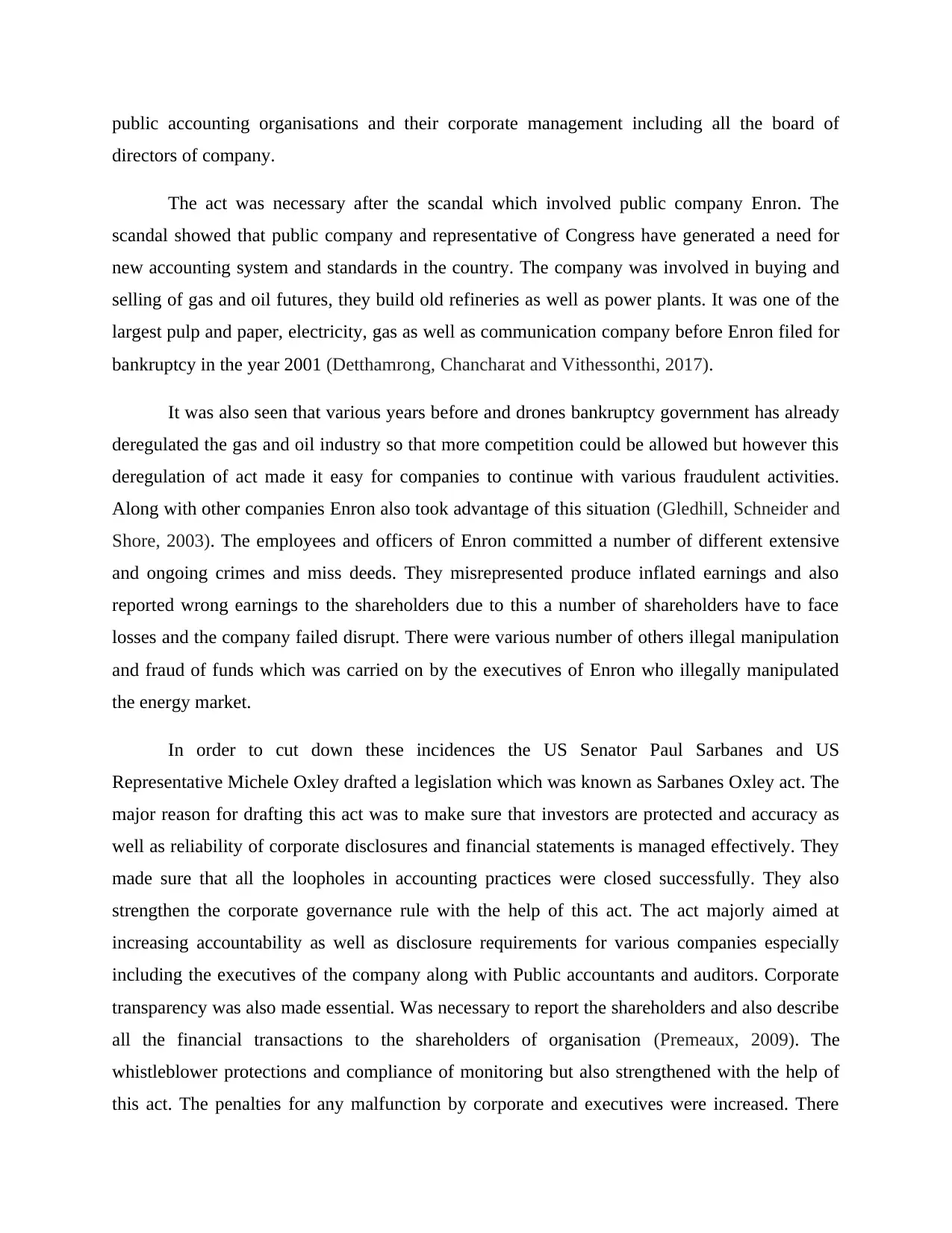
public accounting organisations and their corporate management including all the board of
directors of company.
The act was necessary after the scandal which involved public company Enron. The
scandal showed that public company and representative of Congress have generated a need for
new accounting system and standards in the country. The company was involved in buying and
selling of gas and oil futures, they build old refineries as well as power plants. It was one of the
largest pulp and paper, electricity, gas as well as communication company before Enron filed for
bankruptcy in the year 2001 (Detthamrong, Chancharat and Vithessonthi, 2017).
It was also seen that various years before and drones bankruptcy government has already
deregulated the gas and oil industry so that more competition could be allowed but however this
deregulation of act made it easy for companies to continue with various fraudulent activities.
Along with other companies Enron also took advantage of this situation (Gledhill, Schneider and
Shore, 2003). The employees and officers of Enron committed a number of different extensive
and ongoing crimes and miss deeds. They misrepresented produce inflated earnings and also
reported wrong earnings to the shareholders due to this a number of shareholders have to face
losses and the company failed disrupt. There were various number of others illegal manipulation
and fraud of funds which was carried on by the executives of Enron who illegally manipulated
the energy market.
In order to cut down these incidences the US Senator Paul Sarbanes and US
Representative Michele Oxley drafted a legislation which was known as Sarbanes Oxley act. The
major reason for drafting this act was to make sure that investors are protected and accuracy as
well as reliability of corporate disclosures and financial statements is managed effectively. They
made sure that all the loopholes in accounting practices were closed successfully. They also
strengthen the corporate governance rule with the help of this act. The act majorly aimed at
increasing accountability as well as disclosure requirements for various companies especially
including the executives of the company along with Public accountants and auditors. Corporate
transparency was also made essential. Was necessary to report the shareholders and also describe
all the financial transactions to the shareholders of organisation (Premeaux, 2009). The
whistleblower protections and compliance of monitoring but also strengthened with the help of
this act. The penalties for any malfunction by corporate and executives were increased. There
directors of company.
The act was necessary after the scandal which involved public company Enron. The
scandal showed that public company and representative of Congress have generated a need for
new accounting system and standards in the country. The company was involved in buying and
selling of gas and oil futures, they build old refineries as well as power plants. It was one of the
largest pulp and paper, electricity, gas as well as communication company before Enron filed for
bankruptcy in the year 2001 (Detthamrong, Chancharat and Vithessonthi, 2017).
It was also seen that various years before and drones bankruptcy government has already
deregulated the gas and oil industry so that more competition could be allowed but however this
deregulation of act made it easy for companies to continue with various fraudulent activities.
Along with other companies Enron also took advantage of this situation (Gledhill, Schneider and
Shore, 2003). The employees and officers of Enron committed a number of different extensive
and ongoing crimes and miss deeds. They misrepresented produce inflated earnings and also
reported wrong earnings to the shareholders due to this a number of shareholders have to face
losses and the company failed disrupt. There were various number of others illegal manipulation
and fraud of funds which was carried on by the executives of Enron who illegally manipulated
the energy market.
In order to cut down these incidences the US Senator Paul Sarbanes and US
Representative Michele Oxley drafted a legislation which was known as Sarbanes Oxley act. The
major reason for drafting this act was to make sure that investors are protected and accuracy as
well as reliability of corporate disclosures and financial statements is managed effectively. They
made sure that all the loopholes in accounting practices were closed successfully. They also
strengthen the corporate governance rule with the help of this act. The act majorly aimed at
increasing accountability as well as disclosure requirements for various companies especially
including the executives of the company along with Public accountants and auditors. Corporate
transparency was also made essential. Was necessary to report the shareholders and also describe
all the financial transactions to the shareholders of organisation (Premeaux, 2009). The
whistleblower protections and compliance of monitoring but also strengthened with the help of
this act. The penalties for any malfunction by corporate and executives were increased. There
⊘ This is a preview!⊘
Do you want full access?
Subscribe today to unlock all pages.

Trusted by 1+ million students worldwide
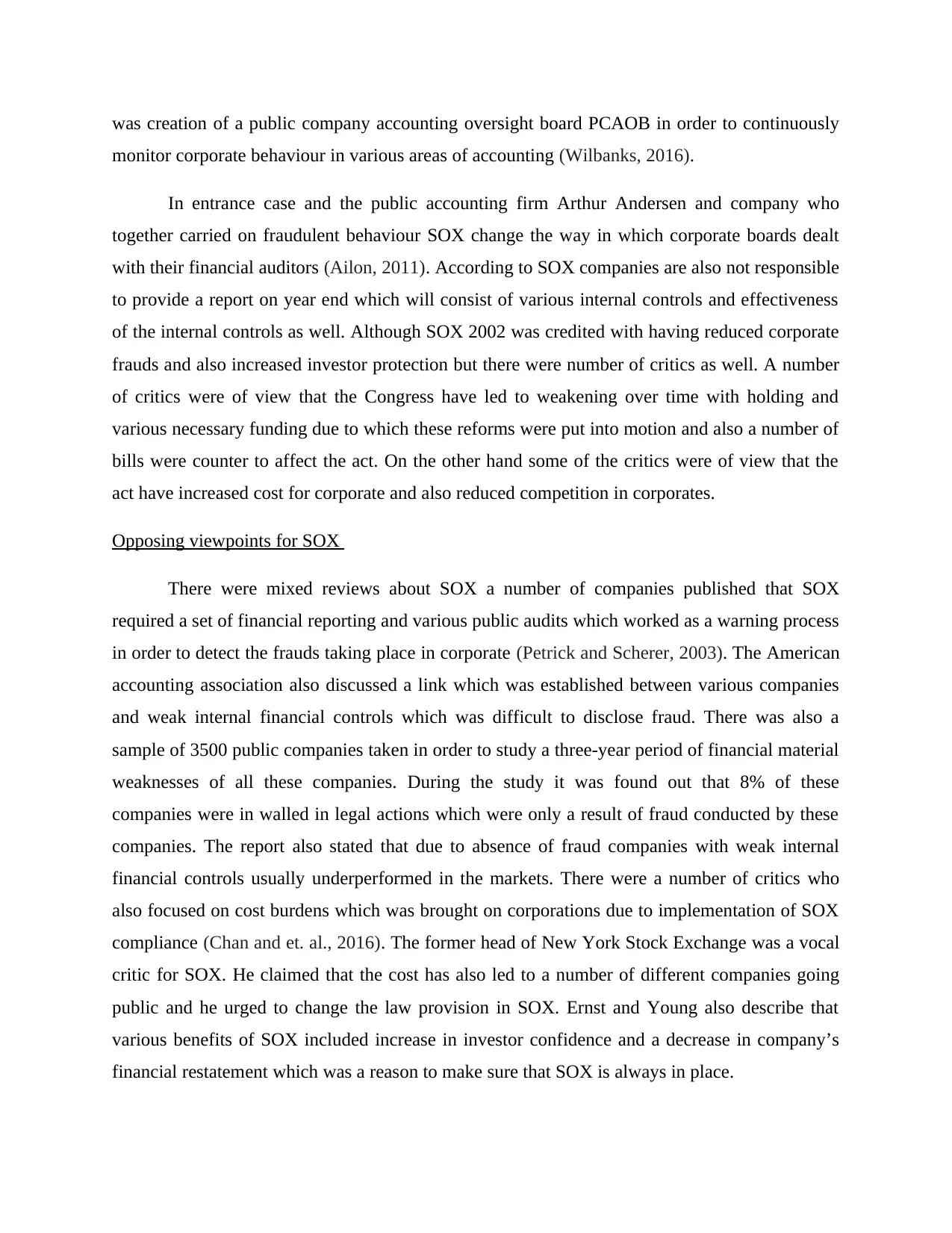
was creation of a public company accounting oversight board PCAOB in order to continuously
monitor corporate behaviour in various areas of accounting (Wilbanks, 2016).
In entrance case and the public accounting firm Arthur Andersen and company who
together carried on fraudulent behaviour SOX change the way in which corporate boards dealt
with their financial auditors (Ailon, 2011). According to SOX companies are also not responsible
to provide a report on year end which will consist of various internal controls and effectiveness
of the internal controls as well. Although SOX 2002 was credited with having reduced corporate
frauds and also increased investor protection but there were number of critics as well. A number
of critics were of view that the Congress have led to weakening over time with holding and
various necessary funding due to which these reforms were put into motion and also a number of
bills were counter to affect the act. On the other hand some of the critics were of view that the
act have increased cost for corporate and also reduced competition in corporates.
Opposing viewpoints for SOX
There were mixed reviews about SOX a number of companies published that SOX
required a set of financial reporting and various public audits which worked as a warning process
in order to detect the frauds taking place in corporate (Petrick and Scherer, 2003). The American
accounting association also discussed a link which was established between various companies
and weak internal financial controls which was difficult to disclose fraud. There was also a
sample of 3500 public companies taken in order to study a three-year period of financial material
weaknesses of all these companies. During the study it was found out that 8% of these
companies were in walled in legal actions which were only a result of fraud conducted by these
companies. The report also stated that due to absence of fraud companies with weak internal
financial controls usually underperformed in the markets. There were a number of critics who
also focused on cost burdens which was brought on corporations due to implementation of SOX
compliance (Chan and et. al., 2016). The former head of New York Stock Exchange was a vocal
critic for SOX. He claimed that the cost has also led to a number of different companies going
public and he urged to change the law provision in SOX. Ernst and Young also describe that
various benefits of SOX included increase in investor confidence and a decrease in company’s
financial restatement which was a reason to make sure that SOX is always in place.
monitor corporate behaviour in various areas of accounting (Wilbanks, 2016).
In entrance case and the public accounting firm Arthur Andersen and company who
together carried on fraudulent behaviour SOX change the way in which corporate boards dealt
with their financial auditors (Ailon, 2011). According to SOX companies are also not responsible
to provide a report on year end which will consist of various internal controls and effectiveness
of the internal controls as well. Although SOX 2002 was credited with having reduced corporate
frauds and also increased investor protection but there were number of critics as well. A number
of critics were of view that the Congress have led to weakening over time with holding and
various necessary funding due to which these reforms were put into motion and also a number of
bills were counter to affect the act. On the other hand some of the critics were of view that the
act have increased cost for corporate and also reduced competition in corporates.
Opposing viewpoints for SOX
There were mixed reviews about SOX a number of companies published that SOX
required a set of financial reporting and various public audits which worked as a warning process
in order to detect the frauds taking place in corporate (Petrick and Scherer, 2003). The American
accounting association also discussed a link which was established between various companies
and weak internal financial controls which was difficult to disclose fraud. There was also a
sample of 3500 public companies taken in order to study a three-year period of financial material
weaknesses of all these companies. During the study it was found out that 8% of these
companies were in walled in legal actions which were only a result of fraud conducted by these
companies. The report also stated that due to absence of fraud companies with weak internal
financial controls usually underperformed in the markets. There were a number of critics who
also focused on cost burdens which was brought on corporations due to implementation of SOX
compliance (Chan and et. al., 2016). The former head of New York Stock Exchange was a vocal
critic for SOX. He claimed that the cost has also led to a number of different companies going
public and he urged to change the law provision in SOX. Ernst and Young also describe that
various benefits of SOX included increase in investor confidence and a decrease in company’s
financial restatement which was a reason to make sure that SOX is always in place.
Paraphrase This Document
Need a fresh take? Get an instant paraphrase of this document with our AI Paraphraser
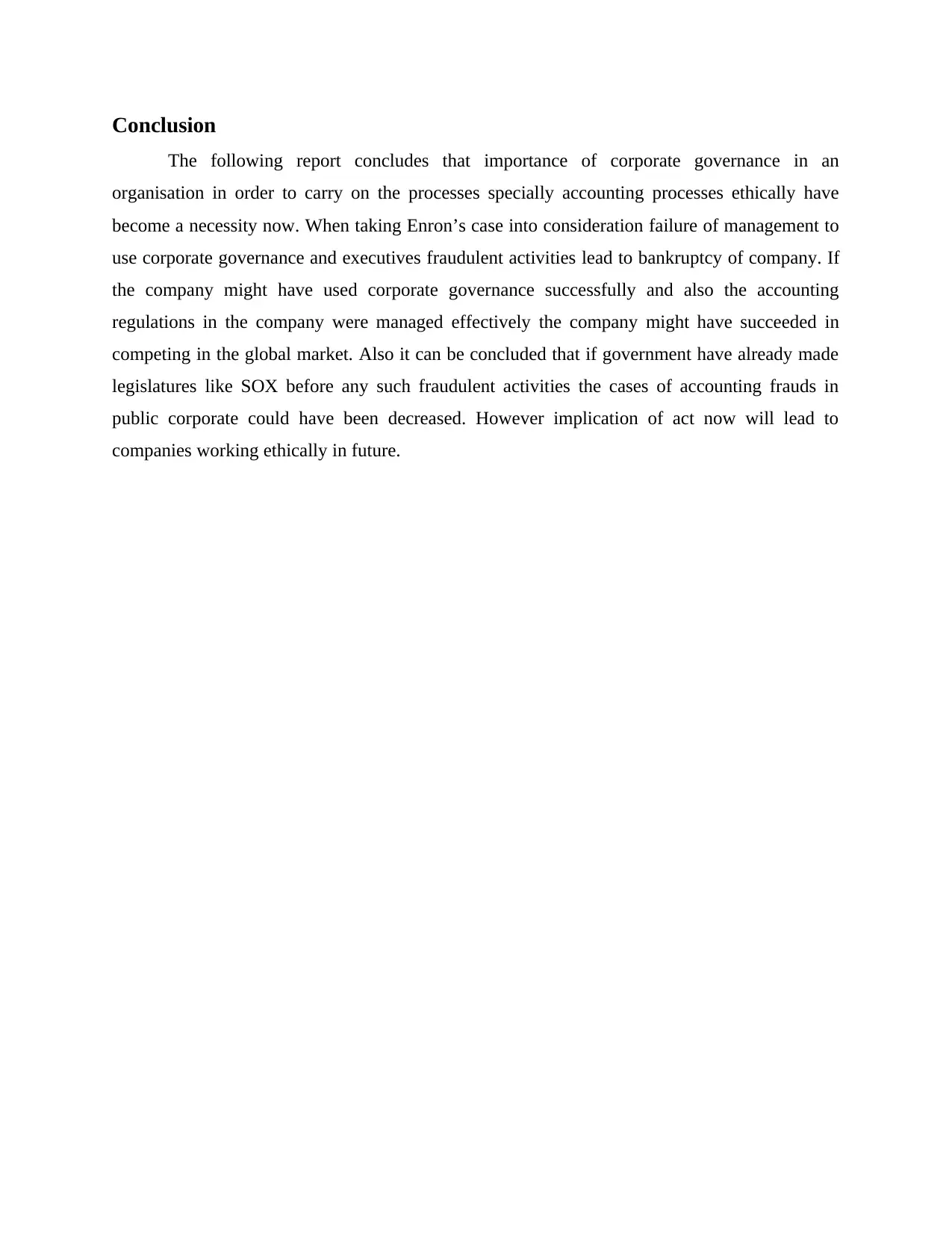
Conclusion
The following report concludes that importance of corporate governance in an
organisation in order to carry on the processes specially accounting processes ethically have
become a necessity now. When taking Enron’s case into consideration failure of management to
use corporate governance and executives fraudulent activities lead to bankruptcy of company. If
the company might have used corporate governance successfully and also the accounting
regulations in the company were managed effectively the company might have succeeded in
competing in the global market. Also it can be concluded that if government have already made
legislatures like SOX before any such fraudulent activities the cases of accounting frauds in
public corporate could have been decreased. However implication of act now will lead to
companies working ethically in future.
The following report concludes that importance of corporate governance in an
organisation in order to carry on the processes specially accounting processes ethically have
become a necessity now. When taking Enron’s case into consideration failure of management to
use corporate governance and executives fraudulent activities lead to bankruptcy of company. If
the company might have used corporate governance successfully and also the accounting
regulations in the company were managed effectively the company might have succeeded in
competing in the global market. Also it can be concluded that if government have already made
legislatures like SOX before any such fraudulent activities the cases of accounting frauds in
public corporate could have been decreased. However implication of act now will lead to
companies working ethically in future.
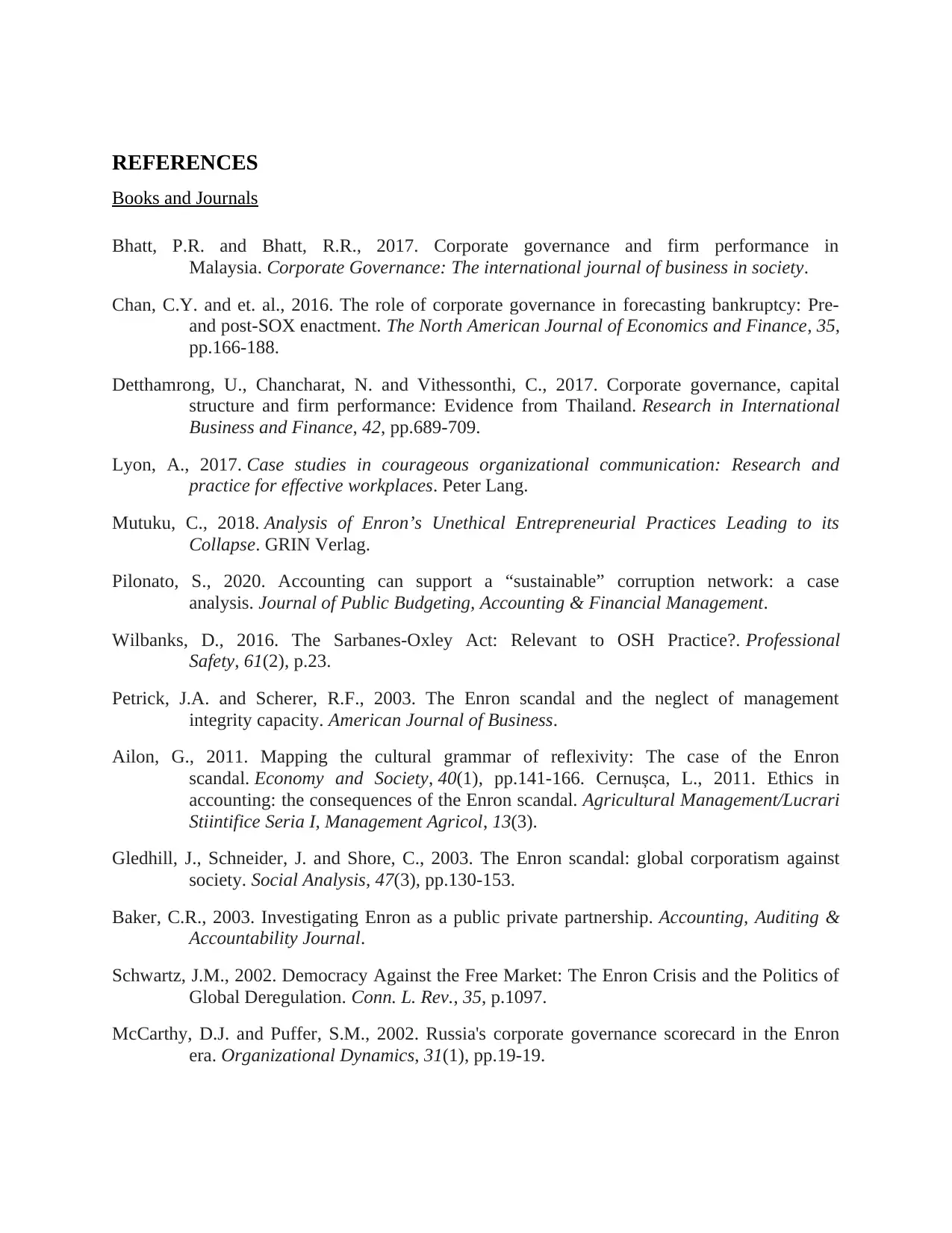
REFERENCES
Books and Journals
Bhatt, P.R. and Bhatt, R.R., 2017. Corporate governance and firm performance in
Malaysia. Corporate Governance: The international journal of business in society.
Chan, C.Y. and et. al., 2016. The role of corporate governance in forecasting bankruptcy: Pre-
and post-SOX enactment. The North American Journal of Economics and Finance, 35,
pp.166-188.
Detthamrong, U., Chancharat, N. and Vithessonthi, C., 2017. Corporate governance, capital
structure and firm performance: Evidence from Thailand. Research in International
Business and Finance, 42, pp.689-709.
Lyon, A., 2017. Case studies in courageous organizational communication: Research and
practice for effective workplaces. Peter Lang.
Mutuku, C., 2018. Analysis of Enron’s Unethical Entrepreneurial Practices Leading to its
Collapse. GRIN Verlag.
Pilonato, S., 2020. Accounting can support a “sustainable” corruption network: a case
analysis. Journal of Public Budgeting, Accounting & Financial Management.
Wilbanks, D., 2016. The Sarbanes-Oxley Act: Relevant to OSH Practice?. Professional
Safety, 61(2), p.23.
Petrick, J.A. and Scherer, R.F., 2003. The Enron scandal and the neglect of management
integrity capacity. American Journal of Business.
Ailon, G., 2011. Mapping the cultural grammar of reflexivity: The case of the Enron
scandal. Economy and Society, 40(1), pp.141-166. Cernușca, L., 2011. Ethics in
accounting: the consequences of the Enron scandal. Agricultural Management/Lucrari
Stiintifice Seria I, Management Agricol, 13(3).
Gledhill, J., Schneider, J. and Shore, C., 2003. The Enron scandal: global corporatism against
society. Social Analysis, 47(3), pp.130-153.
Baker, C.R., 2003. Investigating Enron as a public private partnership. Accounting, Auditing &
Accountability Journal.
Schwartz, J.M., 2002. Democracy Against the Free Market: The Enron Crisis and the Politics of
Global Deregulation. Conn. L. Rev., 35, p.1097.
McCarthy, D.J. and Puffer, S.M., 2002. Russia's corporate governance scorecard in the Enron
era. Organizational Dynamics, 31(1), pp.19-19.
Books and Journals
Bhatt, P.R. and Bhatt, R.R., 2017. Corporate governance and firm performance in
Malaysia. Corporate Governance: The international journal of business in society.
Chan, C.Y. and et. al., 2016. The role of corporate governance in forecasting bankruptcy: Pre-
and post-SOX enactment. The North American Journal of Economics and Finance, 35,
pp.166-188.
Detthamrong, U., Chancharat, N. and Vithessonthi, C., 2017. Corporate governance, capital
structure and firm performance: Evidence from Thailand. Research in International
Business and Finance, 42, pp.689-709.
Lyon, A., 2017. Case studies in courageous organizational communication: Research and
practice for effective workplaces. Peter Lang.
Mutuku, C., 2018. Analysis of Enron’s Unethical Entrepreneurial Practices Leading to its
Collapse. GRIN Verlag.
Pilonato, S., 2020. Accounting can support a “sustainable” corruption network: a case
analysis. Journal of Public Budgeting, Accounting & Financial Management.
Wilbanks, D., 2016. The Sarbanes-Oxley Act: Relevant to OSH Practice?. Professional
Safety, 61(2), p.23.
Petrick, J.A. and Scherer, R.F., 2003. The Enron scandal and the neglect of management
integrity capacity. American Journal of Business.
Ailon, G., 2011. Mapping the cultural grammar of reflexivity: The case of the Enron
scandal. Economy and Society, 40(1), pp.141-166. Cernușca, L., 2011. Ethics in
accounting: the consequences of the Enron scandal. Agricultural Management/Lucrari
Stiintifice Seria I, Management Agricol, 13(3).
Gledhill, J., Schneider, J. and Shore, C., 2003. The Enron scandal: global corporatism against
society. Social Analysis, 47(3), pp.130-153.
Baker, C.R., 2003. Investigating Enron as a public private partnership. Accounting, Auditing &
Accountability Journal.
Schwartz, J.M., 2002. Democracy Against the Free Market: The Enron Crisis and the Politics of
Global Deregulation. Conn. L. Rev., 35, p.1097.
McCarthy, D.J. and Puffer, S.M., 2002. Russia's corporate governance scorecard in the Enron
era. Organizational Dynamics, 31(1), pp.19-19.
⊘ This is a preview!⊘
Do you want full access?
Subscribe today to unlock all pages.

Trusted by 1+ million students worldwide
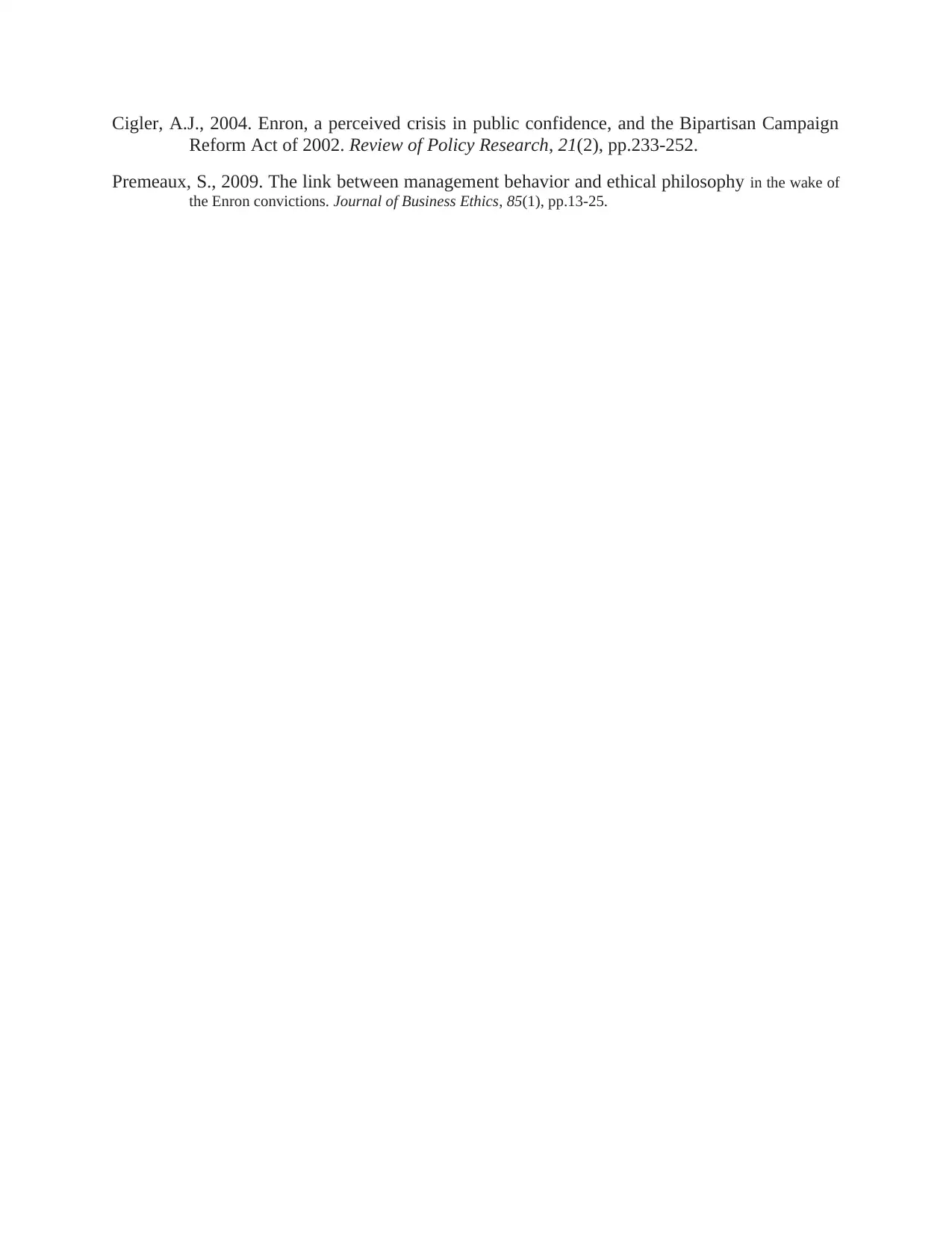
Cigler, A.J., 2004. Enron, a perceived crisis in public confidence, and the Bipartisan Campaign
Reform Act of 2002. Review of Policy Research, 21(2), pp.233-252.
Premeaux, S., 2009. The link between management behavior and ethical philosophy in the wake of
the Enron convictions. Journal of Business Ethics, 85(1), pp.13-25.
Reform Act of 2002. Review of Policy Research, 21(2), pp.233-252.
Premeaux, S., 2009. The link between management behavior and ethical philosophy in the wake of
the Enron convictions. Journal of Business Ethics, 85(1), pp.13-25.
1 out of 10
Related Documents
Your All-in-One AI-Powered Toolkit for Academic Success.
+13062052269
info@desklib.com
Available 24*7 on WhatsApp / Email
![[object Object]](/_next/static/media/star-bottom.7253800d.svg)
Unlock your academic potential
Copyright © 2020–2026 A2Z Services. All Rights Reserved. Developed and managed by ZUCOL.





